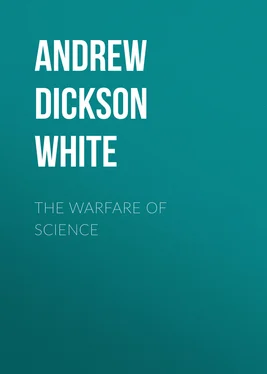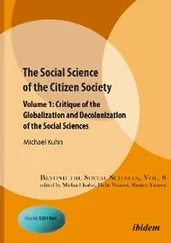Andrew Dickson White - The Warfare of Science
Здесь есть возможность читать онлайн «Andrew Dickson White - The Warfare of Science» — ознакомительный отрывок электронной книги совершенно бесплатно, а после прочтения отрывка купить полную версию. В некоторых случаях можно слушать аудио, скачать через торрент в формате fb2 и присутствует краткое содержание. Жанр: foreign_prose, foreign_religion, Философия, foreign_psychology, foreign_antique, на английском языке. Описание произведения, (предисловие) а так же отзывы посетителей доступны на портале библиотеки ЛибКат.
- Название:The Warfare of Science
- Автор:
- Жанр:
- Год:неизвестен
- ISBN:нет данных
- Рейтинг книги:5 / 5. Голосов: 1
-
Избранное:Добавить в избранное
- Отзывы:
-
Ваша оценка:
- 100
- 1
- 2
- 3
- 4
- 5
The Warfare of Science: краткое содержание, описание и аннотация
Предлагаем к чтению аннотацию, описание, краткое содержание или предисловие (зависит от того, что написал сам автор книги «The Warfare of Science»). Если вы не нашли необходимую информацию о книге — напишите в комментариях, мы постараемся отыскать её.
The Warfare of Science — читать онлайн ознакомительный отрывок
Ниже представлен текст книги, разбитый по страницам. Система сохранения места последней прочитанной страницы, позволяет с удобством читать онлайн бесплатно книгу «The Warfare of Science», без необходимости каждый раз заново искать на чём Вы остановились. Поставьте закладку, и сможете в любой момент перейти на страницу, на которой закончили чтение.
Интервал:
Закладка:
He was vanquished indeed, for he had been forced, in the face of all coming ages, to perjure himself; and, to complete his dishonor, he was obliged to swear to denounce to the Inquisition any other man of science whom he should discover to be supporting heresy—the "heresy of the movement of the earth."
Nor was this all. To the end of his life, nay, after his life was ended, this bitter persecution was continued, on the supposition that the great truths he revealed were hurtful to religion. After a brief stay in the dungeons of the Inquisition, he was kept in exile from family, friends, all his noble employments, and held rigidly to his promise not even to speak of his theory. When, in the midst of intense bodily sufferings from disease and mental sufferings from calamities in his family, he besought some little liberty, he was met with threats of a recommittal to his dungeon. When, at last, a special commissioner had reported to the ecclesiastical authorities that Galileo had become blind and wasted away with disease and sorrow, he was allowed but little more liberty, and that little tempered by the close surveillance of the ecclesiastical authorities. He was forced to bear contemptible attacks on himself and on his works in silence; he lived to see his ideas carefully weeded out from all the church colleges and universities in Europe; and when, in a scientific work, he happened to be spoken of as "renowned," the Inquisition ordered the substitution of the word "notorious." 54 54 Martin , p. 227.
Nor did the persecution cease with his death. Galileo had begged to be buried in his family tomb in Santa Croce; the request was denied: his friends wished to erect a monument over him; this, too, was refused. Pope Urban said to the embassador Niccolini that "it would be an evil example for the world if such honors were rendered to a man who had been brought before the Roman Inquisition for an opinion so false and erroneous, who had communicated it to many others, and who had given so great a scandal to Christendom." 55 55 Martin , p. 243.
In accordance, therefore, with the wish of the pope and the orders of the Inquisition, Galileo was buried ignobly, apart from his family, without fitting ceremony, without monument, without epitaph. Not until forty years after did Pierozzi dare to write his epitaph. Not until a hundred years after did Nelli dare transfer his remains to Santa Croce and erect above them a suitable monument. Even then the old conscientious hostility burst out: the Inquisition was besought to prevent such honors to "a man condemned for notorious errors;" and that tribunal refused to allow any epitaph to be placed above him which had not first been submitted to its censorship. Nor has that old conscientious consistency in hatred yet fully relented; hardly a generation since has not seen some Marini, or De Bonald, or Rallaye, or De Gabriac, suppressing evidence, or torturing expressions, or inventing theories, to blacken the memory of Galileo and save the reputation of the Church. 56 56 For the persecution of Galileo's memory, see Th. Martin , chaps. ix and x. For documentary proofs, see de l'Epinois . For a collection of the slanderous theories invented against Galileo, see Martin , final chapters and appendix. Both these authors are devoted to the Church, but, unlike Monsignor Marini, are too upright to resort to the pious fraud of suppressing documents or interpolating pretended facts.
Конец ознакомительного фрагмента.
Текст предоставлен ООО «ЛитРес».
Прочитайте эту книгу целиком, купив полную легальную версию на ЛитРес.
Безопасно оплатить книгу можно банковской картой Visa, MasterCard, Maestro, со счета мобильного телефона, с платежного терминала, в салоне МТС или Связной, через PayPal, WebMoney, Яндекс.Деньги, QIWI Кошелек, бонусными картами или другим удобным Вам способом.
1
Most fruitful among these were those given by Plato in the Timæus . See, also, Grote on Plato's doctrine of the rotundity of the earth. Also Sir G. C. Lewis's Astronomy of the Ancients , London, 1862, chap. iii., sec. i. and note. Cicero's mention of the antipodes and reference to the passage in the Timæus are even more remarkable than the original, in that they much more clearly foreshadow the modern doctrine. See Academic Questions , ii., xxxix. Also, Tusc. Quest. , i., xxviii., and v., xxiv.
2
See Eusebius , Præp. Ev. , xv., 61.
3
See Lactantius , Inst. , 1., iii., chap. 3. Also, citations in Whewell , Hist. Induct. Sciences , Lond., 1857, vol. i., p. 194. To understand the embarrassment thus caused to scientific men at a later period, see Letter of Agricola to Joachimus Vadianus in 1514. Agricola asks Vadianus to give his views regarding the antipodes, saying that he himself does not know what to do, between the Fathers on one side and learned men of modern times on the other. On the other hand, for the embarrassment caused to the Church by this mistaken zeal of the Fathers, see Kepler's references and Fromund's replies; also De Morgan , Paradoxes , p. 58. Kepler appears to have taken great delight in throwing the views of Lactantius into the teeth of his adversaries.
4
Another germ idea , etc. See Plato , Timæus , 62 C., Jowett's translation, N. Y. ed. Also Phædo , pp. 449, et seq. Also Cicero , Academic Quest. , and Tusc. Disput. , ubi supra . For citations and summaries, see Whewell , Hist. Induct. Sciences , vol. i., p. 189, and St. Martin , Hist. de la Géog. , Paris, 1873, p. 96. Also Leopardi , Saggio sopra gli errori popolari degli antichi , Firenze, 1851, chap. xii., p. 184, et seq.
5
For opinion of Basil, Ambrose, and others, see Lecky , Hist. of Rationalism in Europe , New York, 1872, vol. i., p. 279, note. Also, Letronne , in Revue des Deux Mondes , March, 1834.
6
For Lactantius, see Instit. , iii., 24, translation in the Ante-Nicene Library; also, citations in Whewell , i., 196, and in St. Martin , Histoire de la Géographie , pp. 216, 217. For St. Augustine's opinion, see the Civ. D. , xvi., 9, where this great Father of the Church shows that the existence of the antipodes "nulla ratione credendum est." Also, citations in Buckle's Posthumous Works , vol. ii., p. 645. For a notice of the views of Cosmas in connection with those of Lactantius, Augustine, St. John Chrysostom, and others, see Schoell , Histoire de la Littérature Grecque , vol. vii., pp. 37, et seq.
7
Isaiah xl. 22.
8
Job xxvi. 11.
9
Genesis i. 6.
10
Psalm cxlviii. 4.
11
Genesis vii. 11.
12
See Montfaucon , Collectio Nova Patrum , Paris, 1706, vol ii., p. 188; also pp. 298, 299. The text is illustrated with engravings showing walls and solid vault (firmament), with the whole apparatus of "fountains of the great deep," "windows of heaven," angels, and the mountain behind which the sun is drawn. For an imperfect reduction of one of them, see article Maps in Knight's Dictionary of Mechanics , New York, 1875. For still another theory, very droll, and thought out on similar principles, see Mungo Park, cited in De Morgan , Paradoxes , 309. For Cosmas's joyful summing up, see Montfaucon , Collectio Nova Patrum , vol. ii., p. 255.
Читать дальшеИнтервал:
Закладка:
Похожие книги на «The Warfare of Science»
Представляем Вашему вниманию похожие книги на «The Warfare of Science» списком для выбора. Мы отобрали схожую по названию и смыслу литературу в надежде предоставить читателям больше вариантов отыскать новые, интересные, ещё непрочитанные произведения.
Обсуждение, отзывы о книге «The Warfare of Science» и просто собственные мнения читателей. Оставьте ваши комментарии, напишите, что Вы думаете о произведении, его смысле или главных героях. Укажите что конкретно понравилось, а что нет, и почему Вы так считаете.












